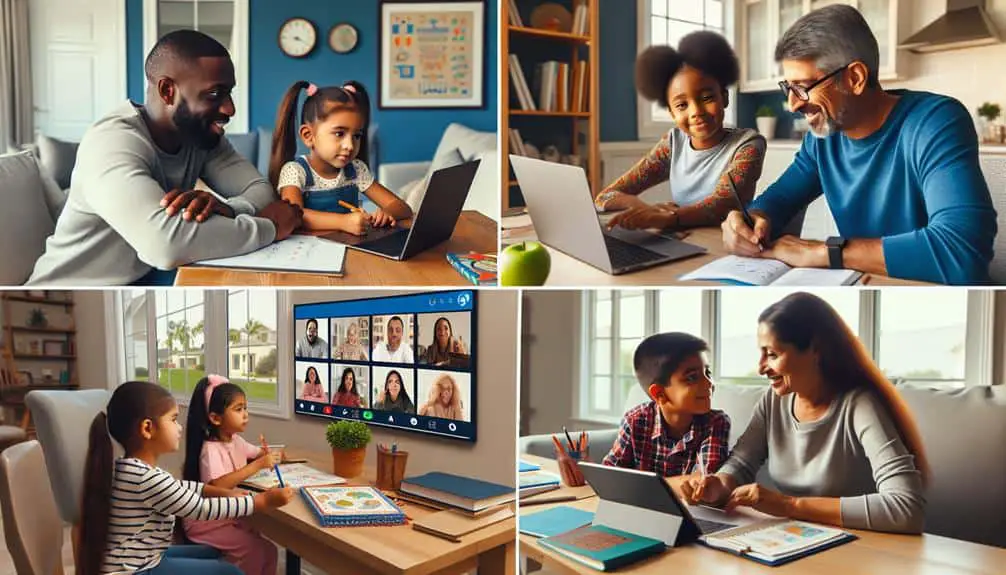For your introverted homeschool child, creating a supportive environment is key. Consider joining homeschool support groups to foster social skills and emotional well-being. These groups offer friendship, confidence building, and a sense of community. Virtual options provide comfortable connections, while in-person groups help with skills development. Focus on quality interactions, respect personal boundaries, and communicate needs for a healthy balance. Engage gradually, seek diverse engagement options, and step out of your comfort zone at your own pace. These tips nurture a positive atmosphere for introverted kids in homeschool settings.
Key Points
- Respect personal boundaries to allow introverted kids to recharge.
- Create quiet spaces for retreat to cater to their need for solitude.
- Encourage participation at their comfort level for gradual social growth.
- Provide opportunities for one-on-one interactions to build connections.
- Offer supportive and understanding environment to boost self-confidence.
Benefits of Homeschooling Support Groups
Joining homeschooling support groups can provide invaluable opportunities for socialization, collaboration, and mutual support for both parents and children. These groups offer a platform for parents to exchange parental guidance and emotional support, creating a network of understanding individuals who share similar challenges and triumphs.
For children, participating in homeschooling support groups opens doors to engaging in social activities and exciting field trips, which can enhance their learning experiences and foster new friendships.
As a parent, these support groups can offer a sense of community and reassurance that you aren't guiding the homeschooling journey alone. Sharing experiences with fellow parents can provide valuable insights and tips, while also offering emotional support during challenging times.
For children, interacting with peers in a supportive environment can boost their confidence and social skills, creating a well-rounded educational experience that goes beyond traditional academics.
Finding the Right Support Group
You may find that the right support group can offer you a sense of belonging and understanding in your homeschooling journey.
These groups can help you build connections with like-minded individuals who share similar experiences and challenges.
Additionally, being part of a support group can provide valuable opportunities for sharing resources, tips, and advice to enhance your homeschooling experience.
Support Group Benefits
Discovering the ideal support group can greatly enhance the homeschooling experience for introverted children. Peer encouragement and emotional support play crucial roles in nurturing a positive environment for introverted kids. Support groups provide a space where children can interact with peers who share similar experiences and challenges, fostering a sense of belonging and understanding.
Peer encouragement within a support group can boost introverted children's confidence and self-esteem. Being surrounded by individuals who appreciate their unique qualities and offer words of encouragement can help introverted kids feel more comfortable expressing themselves and engaging in social activities. Additionally, receiving emotional support from both peers and parents in a support group setting can help introverted children navigate any difficulties they may face during their homeschooling journey.
When selecting a support group, consider the dynamics and values of the group to make sure it aligns with your child's needs. A supportive and understanding environment can empower introverted children to thrive academically and socially, making their homeschooling experience more enriching and fulfilling.
Building Connections
Finding the right support group for your introverted child can greatly impact their homeschooling journey by providing a nurturing and understanding environment for social and emotional growth.
Building friendships and fostering a community within a support group can create connections that offer emotional support for your child. These connections go beyond just academic help; they provide a sense of belonging and understanding that's invaluable for introverted kids.
When seeking a support group, look for one that aligns with your child's interests and values. This common ground can be a starting point for building relationships with like-minded individuals who can offer genuine companionship.
Encourage your child to participate in group activities and discussions to help them feel more connected and supported.
Resource Sharing Opportunities
Amidst your homeschooling journey, exploring resource sharing opportunities within the right support group can greatly enhance your introverted child's learning experience. Online forums and local meetups provide excellent platforms for connecting with other homeschooling families who understand the unique needs of introverted children. Engaging in these communities can offer valuable insights, advice, and support.
Parent resources and educational tools shared within these groups can introduce you to new teaching methods, curriculum ideas, and strategies tailored to your child's introverted nature. By tapping into the collective wisdom of like-minded parents, you can discover innovative ways to create a nurturing homeschool environment that fosters your child's strengths and interests.
Attending local meetups allows your child to interact with peers in a comfortable setting, encouraging socialization at a pace that suits their temperament. These gatherings can also provide opportunities for collaborative learning activities and group projects that enhance your child's educational experience.
Embracing resource sharing within a supportive community can truly enrich your homeschooling journey with your introverted child.
Virtual Support Group Options
Explore various virtual support group options to provide valuable connection and community for your introverted child in their homeschool environment. Virtual support groups can offer a sense of belonging and understanding, even for those who thrive in quieter settings.
Here are some online resources to explore:
- Online Meetups: These virtual gatherings allow your child to interact with peers in a structured online environment, fostering social skills and friendships.
- Discussion Forums: Participating in online forums can provide a platform for your child to engage in conversations, share experiences, and seek advice from other homeschooling families.
- Parent Networking, Workshops: Virtual support groups often offer opportunities for parents to connect, share strategies, and attend workshops to enhance their homeschooling journey, providing additional support and guidance.
In-Person Support Group Benefits
You might find that in-person support groups offer a unique setting for your introverted child to gradually build social skills.
The group dynamics present can facilitate a sense of belonging and understanding, enhancing your child's emotional well-being.
These social connections can provide opportunities for growth and self-confidence in a supportive environment.
Group Dynamics Importance
Engaging in in-person support groups can offer invaluable social interaction and emotional support for introverted children in a homeschool environment. Here are some key reasons why group dynamics play an essential role in nurturing the well-being of introverted kids:
- Understanding Boundaries: Support groups provide a structured environment where children can learn about setting personal boundaries and respecting the boundaries of others. This understanding helps introverted kids feel safe and respected within the group setting.
- Group Participation: Through group activities and discussions, introverted children can gradually build their confidence in expressing themselves among peers. Encouraging participation at their own pace allows them to feel included without being overwhelmed.
- Respectful Communication, Individual Needs: Support groups emphasize the importance of respectful communication, teaching introverted children how to express their thoughts and emotions in a supportive and understanding atmosphere that caters to their individual needs.
Social Connection Benefits
In an in-person support group setting, introverted children benefit greatly from the social connections they establish with peers and mentors. Friendship development is an essential aspect that can help introverted kids feel a sense of belonging and acceptance.
By engaging in social interactions within the support group, they've the opportunity to form meaningful relationships that provide emotional support and understanding.
These connections not only foster friendship development but also contribute to building self-confidence. Through regular interactions with like-minded individuals, introverted children can gradually enhance their social skills and feel more comfortable expressing themselves.
The positive reinforcement and encouragement received from peers and mentors in the support group setting can boost their self-esteem and belief in their abilities.
Balancing Socialization Needs
Finding a balance between social interaction and personal space is crucial for introverted homeschool students. As an introverted learner, you may face socialization challenges that can be overwhelming. Here's how you can navigate this delicate balance:
- Respect Your Personal Boundaries:
It's okay to set limits on social interactions and alone time. Communicate your needs to family members or peers so they understand and can support you accordingly.
- Quality Over Quantity:
Focus on meaningful peer interactions rather than trying to socialize with a large group. Building a few close relationships can provide the social connection you need without feeling drained.
- Create Safe Spaces:
Designate areas in your homeschool environment where you can retreat when feeling overwhelmed. Having a designated quiet spot can help you recharge and maintain a healthy social balance.
Tips for Engaging in Support Groups
Engaging with support groups as an introverted homeschool student involves understanding how to effectively leverage these resources while honoring your need for personal space and meaningful connections.
When it comes to online interaction, consider joining virtual support groups where you can participate at your own pace and comfort level. These online platforms provide a space for sharing experiences, asking questions, and receiving support without the pressure of face-to-face interaction.
In terms of group activities, look for support groups that offer a variety of options. Some groups may focus on individual projects or asynchronous discussions, allowing you to engage in a way that suits your introverted nature.
However, don't shy away from occasional group activities that involve direct interaction. These activities can help you step out of your comfort zone gradually and build connections with like-minded individuals who understand and respect your need for solitude.
Frequently Asked Questions
How Can I Help My Introverted Child Feel Comfortable in a Support Group?
To help your introverted child feel comfortable in a support group, focus on building confidence by encouraging participation at their own pace. Foster connections by creating safe spaces where they can share without pressure.
Are There Support Groups Specifically Tailored for Introverted Homeschoolers?
Looking for support groups tailored for introverted homeschoolers? Online resources make finding community easy. Building confidence and social connections is key. Remember, even for introverts, connecting with others can be fulfilling and empowering.
What Are Some Strategies to Encourage Participation in Virtual Support Groups?
To encourage participation in virtual support groups, try incorporating engaging online activities and icebreakers. Building connections and trust is key. Remember, creating a welcoming environment can help introverted kids feel more comfortable and willing to participate.
How Can I Ensure My Child's Socialization Needs Are Met Through Support Groups?
Looking to guarantee your child's socialization needs are met through support groups? Encourage online connections for socialization opportunities. Engage with the community, participate actively, and foster parent involvement to create a supportive environment for your child.
Can Support Groups Help Introverted Children Develop Social Skills Effectively?
Support groups can be beneficial for introverted children to develop social skills effectively. By practicing socialization techniques in a safe environment, they can gradually build confidence in group interactions, fostering growth and comfort in social settings.



